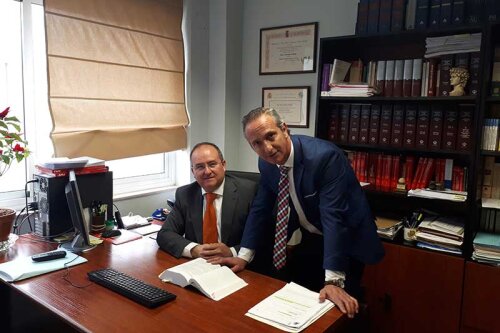Best Conveyancing Lawyers in Cáceres
Share your needs with us, get contacted by law firms.
Free. Takes 2 min.
Free Guide to Hiring a Real Estate Lawyer
List of the best lawyers in Cáceres, Spain
About Conveyancing Law in Cáceres, Spain
Conveyancing is the legal process of transferring property ownership from one person to another. In Cáceres, located in the autonomous community of Extremadura, Spain, conveyancing law follows the national legal framework while also considering local customs and administrative procedures. Whether buying, selling, or inheriting property, it is essential to follow the legal requirements to ensure the transaction is valid and enforceable. Conveyancing in Cáceres involves several stages, including drafting contracts, conducting due diligence, registering property with the local Land Registry, and managing tax affairs associated with property transfer.
Why You May Need a Lawyer
People often seek legal advice for conveyancing in Cáceres for a variety of reasons. Some common situations include:
- Purchasing or selling a residential or commercial property
- Dealing with legal disputes related to property boundaries or ownership
- Inheritance and transferring property titles among heirs
- Resolving complex issues with paperwork or existing debts attached to the property (such as mortgages or unpaid taxes)
- Navigating language barriers or unfamiliar legal procedures for non-Spanish speakers
- Securing a mortgage or other financial arrangements for property purchase
Lawyers who specialize in conveyancing help clients navigate local laws, ensure that contracts are legally sound, and protect clients from unforeseen legal risks, such as hidden debts or irregularities in the property’s documentation.
Local Laws Overview
Several key legal provisions are particularly relevant to conveyancing in Cáceres:
- Public Deed Requirement: Property transfer must be formalized in a public deed signed before a Spanish notary.
- Land Registry (Registro de la Propiedad): All property transfers must be recorded at the local Land Registry to protect the ownership rights of the new owner.
- Due Diligence: Law requires verification of the property’s legal status, including ensuring there are no outstanding debts, unpaid taxes, boundary issues, or building regulation violations.
- Tax Obligations: Both buyer and seller need to consider taxes such as Transfer Tax (Impuesto de Transmisiones Patrimoniales) or Value Added Tax, tax on property value increase (Plusvalía Municipal), and potentially Capital Gains Tax for sellers.
- Local Planning and Building Regulations: Any building on the property must comply with Cáceres' urban planning regulations, and non-compliance can severely affect the transaction.
Adhering to these and other local requirements is crucial to a successful and legally sound property transfer.
Frequently Asked Questions
What is the role of a notary in the property purchase process?
A notary in Spain is a public official who ensures that property transfers comply with the law. They authenticate the transaction, verify the identity and capacity of the parties involved, and make sure all necessary documents are in order before deeds are signed.
Do I need to be present in Cáceres to buy or sell property?
While personal attendance is common, you can also appoint a legal representative through a Power of Attorney to act on your behalf in Cáceres. This is especially helpful for non-residents or those unable to travel.
What taxes will I have to pay when buying property in Cáceres?
Buyers typically pay the Transfer Tax (Impuesto de Transmisiones Patrimoniales) for resale properties or VAT (IVA) and Stamp Duty for new builds. The seller may owe Capital Gains Tax and the Plusvalía Municipal tax. Rates can vary depending on the property value and type.
How long does the conveyancing process take in Cáceres?
The timeline can vary but generally ranges from a few weeks to a couple of months, depending on due diligence, obtaining certificates, and arranging financing. Complex cases may require more time.
What documents are needed for property transfer?
Key documents include the public deed of sale, Land Registry extract (Nota Simple), property tax receipts, energy certificate, and proof of payment of taxes and community fees.
Can foreign nationals purchase property in Cáceres?
Yes, there are no legal restrictions for foreigners buying property in Spain, including Cáceres. However, buyers need a Spanish tax identification number (NIE).
What are the most common legal risks when buying property?
Risks include unclear ownership, undisclosed debts or charges against the property, planning violations, and non-payment of related taxes. Legal advice can help identify and resolve these issues before completion.
Is property inheritance handled differently in Cáceres?
Inheritance follows Spanish national law but can be influenced by regional regulations on inheritance tax and procedures. Engaging a local lawyer is advised to navigate these complexities.
What is a reservation contract?
A reservation contract is a preliminary agreement in which the buyer pays a deposit to secure the property while legal checks are completed. This contract should define conditions and refund policies.
How can I make sure a property is free of debts or charges?
Your lawyer can obtain a Nota Simple from the Land Registry, which will reveal any charges, mortgages, court orders, or other encumbrances on the property before the sale.
Additional Resources
If you are seeking more information or assistance with conveyancing in Cáceres, consider reaching out to the following resources:
- Ilustre Colegio de Abogados de Cáceres (Bar Association of Cáceres): Offers legal guidance and can provide lawyer referrals.
- Registro de la Propiedad de Cáceres (Cáceres Land Registry): For information on property registration and title search.
- Notarial Associations in Extremadura: For notary services and consultations regarding conveyancing documents.
- Ayuntamiento de Cáceres (City Council): For information on local urban planning, taxes, and fees applicable to property transfers.
- Spanish Ministry of Justice: Provides broad information on property law and legal procedures in Spain.
Next Steps
If you need legal advice or assistance with conveyancing in Cáceres, consider taking the following steps:
- Contact a specialist conveyancing lawyer in Cáceres for tailored advice based on your situation.
- Request a preliminary study of the property, including a Land Registry report and assessment of outstanding debts or legal issues.
- Prepare all necessary documents, such as identification, tax numbers, and any existing contracts or property deeds.
- Arrange a meeting with a local notary to discuss the signing process and verify documentation.
- Stay informed about relevant taxes and legal fees, and set aside funds to cover these costs.
- If you are a non-resident or are not fluent in Spanish, consider securing both legal and translation support throughout the process.
Starting with professional advice will help ensure a smooth, secure, and legally compliant property transaction in Cáceres.
Lawzana helps you find the best lawyers and law firms in Cáceres through a curated and pre-screened list of qualified legal professionals. Our platform offers rankings and detailed profiles of attorneys and law firms, allowing you to compare based on practice areas, including Conveyancing, experience, and client feedback.
Each profile includes a description of the firm's areas of practice, client reviews, team members and partners, year of establishment, spoken languages, office locations, contact information, social media presence, and any published articles or resources. Most firms on our platform speak English and are experienced in both local and international legal matters.
Get a quote from top-rated law firms in Cáceres, Spain — quickly, securely, and without unnecessary hassle.
Disclaimer:
The information provided on this page is for general informational purposes only and does not constitute legal advice. While we strive to ensure the accuracy and relevance of the content, legal information may change over time, and interpretations of the law can vary. You should always consult with a qualified legal professional for advice specific to your situation.
We disclaim all liability for actions taken or not taken based on the content of this page. If you believe any information is incorrect or outdated, please contact us, and we will review and update it where appropriate.









